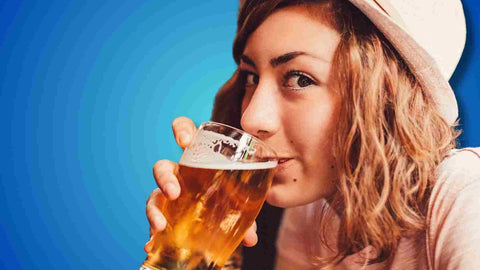Is Beer Bad for Your Teeth?
Yes, beer can be bad for your teeth, primarily due to its acidity and carbohydrate content.
For example, the acidic nature of beer can contribute to the erosion of tooth enamel over time. Enamel erosion weakens your teeth, making them more susceptible to decay and increasing sensitivity to temperature changes and certain foods.
Additionally, the carbohydrates in beer, particularly those in darker and sweeter beers, can feed the harmful bacteria in your mouth. These bacteria produce acids as they digest the sugars, further attacking your tooth enamel and leading to cavities.
However, that doesn't mean you can't enjoy beer in moderation. After drinking beer, rinsing your mouth with water or herbal mouthwash (not rubbing alcohol!) can help neutralize the acids and reduce the potential for enamel erosion.
You should also plan to stay well-hydrated by drinking plenty of water alongside your beer to fight dry mouth, which can otherwise lead to tooth decay.
In this article, I'll explain everything you need to know about how beer can affect your teeth and how to prevent any side effects.
How does beer affect your teeth?

Beer can have several effects on your teeth and overall oral health. influenced by its ingredients, acidity, and carbohydrate content. Here's a quick rundown of how beer can impact your dental health:
-
Acidity: Beer, like many other alcoholic beverages, is acidic. Regularly exposing yourself to acidic drinks can lead to enamel erosion over time. Enamel erosion weakens teeth, making them more susceptible to decay and increasing sensitivity to hot and cold foods and drinks.
-
Carbohydrates: Beer contains carbohydrates, which can feed the bad bacteria in your mouth. These bacteria produce acids as they digest the sugars which can contribute to the formation of tooth decay and cavities.
-
Staining: Darker beers, similar to coffee, tea and wine, can stain our teeth due to their color and the presence of certain ingredients like cereal grain, malts, and barley. This is common among many craft beers. These stains are usually superficial but can affect the appearance of your smile over time.
-
Dry Mouth: Drinking alcohol, including having too much beer, can reduce saliva production and lead to dry mouth. We need salivary flow to neutralize acids in our mouths and stimulate remineralization. Therefore, a reduction in saliva not only increases your risk of tooth decay but also can contribute to other oral health and gum health issues, such as gum disease and bad breath.
To mitigate the effects of too much alcohol on your oral health, it's important to consume drink beer in moderation and stay hydrated. For example, try to drink water alongside your beer to help counteract its drying effects and rinse away sugars and acids.
Health Benefits of Drinking Beer for Your Teeth

While beer is not typically associated with dental health benefits, moderate consumption may offer some indirect advantages for your teeth and overall oral health.
First, beer contains trace amounts of minerals that are beneficial for tooth health, particularly calcium. Calcium and phosphorus are essential for maintaining strong tooth enamel, which is why they're found in remineralizing toothpaste.
Also, some studies suggest that the hops in beer possess antibacterial properties that could fight against certain oral pathogens, potentially reducing your risk of gum disease and tooth decay.
Finally, the polyphenols in beer, also found in green tea, including the ingredients used to brew beer, may also have a protective effect against oral bacteria that cause plaque formation.
All that said, please note that these potential benefits don't outweigh the negative effects of drinking alcohol.
Remember that the acidic nature of beer can erode tooth enamel, and the beverage's carbohydrate content can feed harmful oral bacteria, leading to decay.
How to Prevent Alcohol from Affecting Your Teeth

Protecting your teeth from the effects of alcohol involves mindful habits and a commitment to oral hygiene.
Start by staying hydrated, especially when you're enjoying a drink. Alcohol tends to dry out your mouth, reducing the saliva that's crucial for neutralizing harmful acids and washing away food debris. So, by drinking water alongside your alcoholic beverages, you help maintain saliva flow and dilute any acids, sugars, and staining agents present in your drink.
Additionally, make smarter choices when it comes to selecting your drinks. Opt for those with lower sugar content and acidity, like vodka, to minimize the risk of tooth decay and enamel erosion.

If you do indulge in a sugary cocktail or acidic wine, try not to sip it over an extended period, as this prolongs your teeth's exposure to these harmful elements.
Then, after enjoying your drink, take a moment to rinse your mouth with water or alkaline mouthwash. This simple step can significantly reduce the potential damage by neutralizing acids and flushing away residues that could lead to stains or decay.
However, resist the urge to brush your teeth immediately after drinking, particularly if you've had something acidic. This includes not brushing your teeth after drinking tea. Brushing too soon can spread the acid more evenly across the surfaces of your teeth, exacerbating enamel wear.
Instead, wait at least 30 minutes, allowing your saliva to naturally restore the mouth's pH balance.
Finally, remember that maintaining a consistent oral hygiene routine, including brushing twice daily with nano hydroxyapatite toothpaste and flossing with expandable floss, is key.
Which alcoholic beverages are the worst for oral health?

Certain alcoholic beverages pose more significant risks to oral health than others, primarily due to their sugar content, acidity, and coloring agents. Let's walk through some of worst offenders.
Sweet Mixed Drinks and Cocktails
We all know sugary drinks are not the best for maintaining healthy teeth. These are often loaded with sugar, which feeds the harmful bacteria in your mouth. The bacteria produce acid as they digest the sugar, leading to tooth decay and cavities. Additionally, the acidic mixers used in cocktails can contribute to enamel erosion.
Fruit Wines and Sweet Wines
Like sweet mixed drinks, fruit wines and sweet wines contain high levels of sugar, increasing the risk of tooth decay. Their acidity can also accelerate enamel erosion, making teeth more susceptible to sensitivity and decay.
Fortified Wines
Fortified wines, such as port and sherry, have higher sugar content than regular wines, posing similar risks for tooth decay and enamel erosion due to their sweetness and acidity.
Dark-Colored Beverages
Red wine, dark beers, and certain spirits mixed with dark-colored sodas can cause staining of the teeth. Red wine, in particular, is known for its tannins and chromogens, which adhere to the enamel and lead to discoloration. While not directly impacting tooth health, these stains can affect the appearance of your smile.
Alcoholic Beverages with High Acidity

Besides their sugar content, drinks like white wine and some beers have high acidity levels. This acidity can weaken and erode tooth enamel over time, increasing the risk of decay and making teeth more sensitive.
Frequently Asked Questions
Can beer cause tooth decay?
Yes, beer can contribute to tooth decay due to its acidic nature and carbohydrate content, which can feed harmful bacteria in the mouth. However, the risk of tooth decay from beer consumption can be mitigated by practicing good oral hygiene habits and consuming beer in moderation. Regular brushing with nano hydroxyapatite toothpaste, expandable flossing, and routine dental check-ups can help minimize the impact of beer on dental health.
What alcohol is least damaging to teeth?
Among alcoholic beverages, vodka is often considered one of the least damaging options for teeth. This is because vodka is clear and typically has a lower sugar content compared to other alcoholic drinks like beer, wine, or cocktails. However, it's essential to consume any alcoholic beverage in moderation and maintain good oral hygiene practices to minimize potential dental damage.
Should you brush your teeth after drinking beer?
Yes, it's generally advisable to brush your teeth after drinking beer, especially if you've consumed it along with other sugary or acidic foods or beverages. Beer's acidity and carbohydrate content can contribute to tooth decay, so brushing can help remove any residue and minimize potential damage to your teeth. However, if brushing immediately isn't possible, rinsing your mouth with water can also help mitigate the effects until you can brush.
Is light beer good for your teeth?
Light beer typically contains fewer carbohydrates and calories compared to regular beer, which can be beneficial for dental health as it reduces the potential for feeding harmful bacteria in the mouth. However, light beer still contains acids and can contribute to tooth decay if consumed excessively. Moderation and good oral hygiene practices remain essential for maintaining dental health regardless of the type of beer consumed.
Is light beer OK to drink everyday?
While light beer may have lower calorie and carbohydrate content compared to regular beer, drinking it every day can still have negative health effects. Regular alcohol consumption, even of lighter varieties, can contribute to various health issues such as liver damage, weight gain, and increased risk of certain cancers. It's important to consume alcohol in moderation and consider its impact on overall health when making daily drinking choices.
How can I drink beer without damaging my teeth?
To minimize damage to your teeth when drinking beer, rinse your mouth with water after drinking to neutralize acids and reduce plaque buildup. Avoid sugary, flavored, or high-alcohol beers, as they can be more acidic and contribute to enamel erosion. Drinking in moderation and maintaining a good oral hygiene routine also helps protect your teeth.
Which beer is good for teeth?
Beers that are less acidic, like light lagers or wheat beers, are generally less harmful to your teeth. These beers tend to have a lower pH level compared to darker, more acidic varieties like stouts or IPAs. Choosing options with lower sugar content also helps reduce the risk of cavities.
Which alcohol is best for your teeth?
Dry wines, particularly red wines, are considered less harmful for teeth compared to sweet wines or sugary cocktails. They have natural compounds that may help reduce bacteria in the mouth. Clear spirits like vodka or gin are also less likely to stain teeth or contribute to enamel erosion when consumed in moderation.
What is the most unhealthy beer?
The most unhealthy beers are typically dark, sugary, or highly alcoholic brews, such as stouts, porters, or flavored craft beers, as they are more acidic and can lead to enamel erosion and staining. Beer with high sugar content can also increase the risk of cavities and other dental issues.
Is beer better for teeth than soda?
Beer is generally considered to be less harmful to teeth than soda. While both beverages can negatively affect dental health, soda contains high levels of sugar and acids that can erode tooth enamel and lead to cavities more significantly than beer does. Beer may still have sugars and acidity, but it typically has less impact on enamel erosion compared to soda's high acidity and sugar content.
What alcohol is OK for teeth?
Moderate consumption of certain types of alcohol, particularly light beers and dry wines, may be less harmful to teeth compared to sugary cocktails or sodas. Light beers tend to have lower acidity and sugars, while dry wines have less residual sugar, which can reduce the risk of tooth decay. However, it's essential to maintain good oral hygiene practices regardless of alcohol consumption to protect your dental health.






















